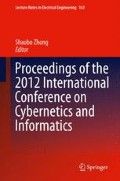Abstract
With the development of information society, the Local Area Network (LAN) technology has become an important part of the computer science and other related disciplines in the universities. In this paper, we analyze the teaching status of LAN technology course and aim to solve some problems existing in its current education. Under the guidance of the distributed cognitive theory, a novel teaching method is proposed to improve teaching quality. This approach is combined with the project practice teaching method to help students to actively learn. It concentrates on the student practical activities under the teacher guidance and emphasizes to combine theory with practice. Through 2-year course in practice, the effectiveness and feasibility of this approach have been proved.
Access this chapter
Tax calculation will be finalised at checkout
Purchases are for personal use only
References
Harte L (2003) Introduction to data networks: PDN, LAN, MAN, WAN, and wireless data, technologies and systems, vol 6. ALTHOS, Fuquay Varina, pp 198–202
Yang W, Jia XF, Yang SZ (2009) Construction, administration and maintenance of LAN, vol 12. Posts & Telecom press, Beijing, pp 36–44
Hollan J, Hutchins E, Kirsh D (2000) Distributed cognition: toward a new foundation for human-computer interaction research. Trans Comput-Human Interact 7(2):174–196. doi:10.1145/353485.353487
Henkelman G, Johannesson G, Jónsson H (2000) Theoretical methods in condensed phase chemistry. In: Schwartz SD (ed) Progress in theoretical chemistry and physics, Chap. 10, vol 5, Kluwer, Dordrecht, 39, pp 381–388
Salomon G (1993) Distributed cognitions: psychological and considerations, vol 31. Cambridge University Press, London, pp 467–472
Zhou G, Fu L (2002) Distributed cognition: a new cognitive perspective. Adv Psychol 10(2):147–152
Acknowledgments
This work is supported by the Natural Science Foundation of China under Grant No. 60871092, the Fundamental Research Funds for the Central Universities of China under Grant No. XDJK2010B002, the Doctoral Funds of Southwest University under Grant No.SWU110063.
Author information
Authors and Affiliations
Corresponding author
Editor information
Editors and Affiliations
Rights and permissions
Copyright information
© 2014 Springer Science+Business Media New York
About this paper
Cite this paper
Wang, J. (2014). A Distributed Cognition and Project Practice Based Teaching Method for LAN Technology Course. In: Zhong, S. (eds) Proceedings of the 2012 International Conference on Cybernetics and Informatics. Lecture Notes in Electrical Engineering, vol 163. Springer, New York, NY. https://doi.org/10.1007/978-1-4614-3872-4_6
Download citation
DOI: https://doi.org/10.1007/978-1-4614-3872-4_6
Published:
Publisher Name: Springer, New York, NY
Print ISBN: 978-1-4614-3871-7
Online ISBN: 978-1-4614-3872-4
eBook Packages: EngineeringEngineering (R0)

